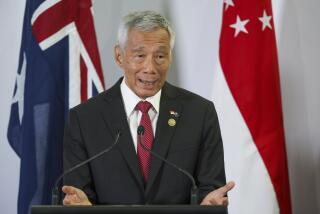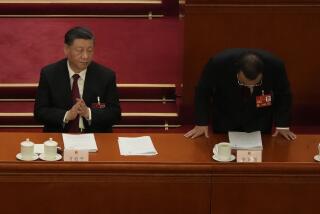New Hong Kong Chief Stresses Family Issues
- Share via
HONG KONG — Chief Executive Tung Chee-hwa moved quickly Tuesday--the first day of Chinese rule here--to shift people’s attention from politics to pocketbook issues, pledging a chicken in every wok.
Tung, the shipping magnate selected with Beijing’s backing to lead Hong Kong now that it has become China’s newest and richest region, focused on issues close to the hearts of Hong Kong people in his first policy speech. He vowed to promote Hong Kong’s prosperity and democracy and announced improvements in education, housing and care of the elderly.
“For the first time in the history of Hong Kong, we now have the opportunity to chart our own destiny,” said Tung, the territory’s first leader to be locally chosen rather than appointed by Britain. “We will move forward with conviction, prudence and determination.”
A few hours earlier, an appointed council had replaced Hong Kong’s elected legislature and immediately passed controversial laws limiting a handful of civil liberties. But Tung promised elections for a new legislature in May. “Democracy,” he said, “is the hallmark of a new era for Hong Kong.”
Sharing the stage with China’s top leader, President Jiang Zemin, Tung nevertheless took pains to emphasize that although Hong Kong is now part of China, its social, economic and political systems will remain distinct. Tung delivered the address in Cantonese, Hong Kong’s local dialect, not in Mandarin, the official language of China.
Appearing tired after a nearly sleepless night of nonstop hand-over ceremonies and celebrations, Tung confronted the issues left to his care by the departed British government. Hong Kong’s most serious challenges, he said, include housing, an aging population, growing inflation and a shifting economy. “Beneath the surface of prosperity, there are insidious threats which are taxing our courage and determination,” he said.
*
His top priority is to “enhance Hong Kong’s economic vitality and sustain economic growth,” Tung said. “Only through the creation of wealth can we improve the living of the people of Hong Kong.”
While Hong Kong has more than its share of billionaires--Tung is one--more than half its 6.3 million people can’t afford a private apartment and live in government housing. After he made a campaign visit to a public housing project last year, and saw how many children must share not only a room but also a bed with their parents or siblings, he declared himself “shocked.”
The policy result: a plan to make more government-controlled land available to the market to curb speculation, and make 85,000 apartments a year available for housing. In 10 years, Tung said in his speech, he hopes to see a home ownership rate of 70%.
Along with housing reform, Tung focused on several other persistent livelihood problems. He outlined a social security scheme and community programs to help the elderly, many of whom rely on their children to care for them or live alone and in poverty.
He announced improvements in basic education, vowing to hire more qualified teachers and open more classes for primary schools. Now, many students must attend classes in half-day shifts because of overcrowding.
“Tung certainly hopes he can win support for his administration and win the hearts of the people through the improvement of services,” said Joseph Cheng, a political scientist from City University in Hong Kong. “People are looking for reassurance.”
Tung’s popularity dropped after he cemented plans, in advance of the hand-over, to limit certain civil liberties and disband Hong Kong’s elected legislature, with his 57% approval rating trailing that of Chris Patten, Britain’s last governor, who received 79% in a recent survey.
Tung, a lifelong businessman who was plucked from the helm of his family’s shipping company to steer Hong Kong into the future, says he doesn’t care about polls, and just wants to get on with the job of governing. He cites Singaporean Senior Minister Lee Kuan Yew, former British Prime Minister Margaret Thatcher and Deng Xiaoping, the late Chinese “paramount leader,” as his political role models.
During Tung’s speech, several thousand protesters marched through Hong Kong’s streets demanding that China’s Communist Party give way to democracy--an action made illegal by the appointed legislature early Tuesday morning.
Tung has apparently directed police to refrain from making arrests for such “political crimes” in the early days of the new Hong Kong, and none of Tuesday’s demonstrators was arrested. But in his speech, Tung sent a message to dissenters urging a return to “traditional Chinese values.”
“We value plurality but discourage open confrontation; we strive for liberty but not at the expense of the rule of law; we respect minority views but also shoulder collective responsibilities.”
Tuesday’s speech says as much about the future of Hong Kong as it does about Tung’s own values. Born to privilege and raised in a traditional Chinese household, Tung believes in a sense of duty. When his father’s shipping empire, Orient Overseas, ran aground, he took it over and worked around the clock for months, persuading bankers and investors to help it get back afloat. One $120-million lifeline came from an unlikely source: China.
When Beijing was searching for Hong Kong’s next leader, Tung reluctantly tossed his hat into the ring, he said, after being persuaded that it was time to serve his country.
In the same vein, Tung wants to restore that sense of duty to Hong Kong at large. “We have to foster among our youngsters a sense of responsibility toward the family, the community, the country and the world,” he said.
Critics say that “Chinese values” is a smoke screen for authoritarian rule. While sounding noble, it is also politically expedient: Patriotic children may be less likely to become troublesome dissidents, family duty can take the place of government obligations. In the speech, Tung encouraged families to live with their elderly members, promising benefits to both government and the family.
The policy address, above all, showed Tung’s fine sense of balancing the demands of Beijing’s Communist government with the hopes of Hong Kong’s freewheeling capitalist society. He promised to “preserve Hong Kong’s existing freedoms and lifestyle,” while asking people to rein themselves in.
He promised to maintain Hong Kong’s separation from China, while urging recognition of Hong Kong’s obligation to the motherland.
“Accommodation is Tung’s hallmark,” said a member of his inner circle, “and that will be the deciding factor for Hong Kong’s future direction, for better or worse.”
(BEGIN TEXT OF INFOBOX / INFOGRAPHIC)
Profile: Tung Chee-hwa
Background on the new leader of Hong Kong:
* Age: 60
* Education: University of Liverpool
* Career: Shipping executive has held numerous civic appointments; served in departed Hong Kong Gov. Chris Patten’s inner Cabinet before being selected as chief executive of the new special administrative region. Tung’s Cabinet includes new pro-China figures and holdovers from the colonial government.
* Personal: Married with two sons and one daughter
Source: International Who’s Who
More to Read
Sign up for Essential California
The most important California stories and recommendations in your inbox every morning.
You may occasionally receive promotional content from the Los Angeles Times.













